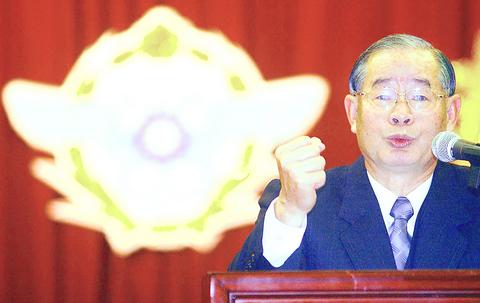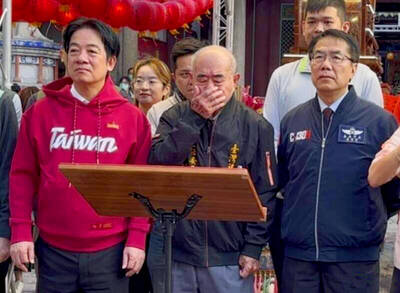Minister of National Defense Tang Yao-ming (
"Within 10 years, we expect to have the capabilities to effectively defend against China's ballistic missiles," Tang said.
Tang made the announcement yesterday at the first press conference he has called this year.

PHOTO: AFP
Tang did not go into detail about the missile defense system (MDS) that the military is developing.
But it was the first time that Tang made public a timetable for the development of the MDS, which had aroused much speculation from the press.
At the press conference, Tang talked about how the development of the MDS could counter China's development of ballistic missiles.
"Over the past one year, China has launched a total of 11 missile tests. It is actively developing missiles with a range of 6,000km, 8,000km, and 12,000km. The move clearly reflects China's ambitions," Tang said.
To counter missile threats from China, Tang said, "The military has set up a task force to plan for the establishment of a comprehensive missile defense system."
Tang refused to confirm whether the MDS will have anything to do with the theater missile defense system that the US plans to build in East Asia.
The development of MDS will be divided into three stages, defense sources said.
At the first stage, the military will build and deploy land-based missile interceptors and sensors (mainly radar) across the country.
The Patriot PAC-III missile defense system and a long-range radar are to be the key elements of the MDS at this stage.
The second stage will extend the deployment of missile interceptors and sensors to the sea.
The Kidd-class destroyers are to be the platform for the interceptors and sensors.
At the final stage, the military will seek to acquire airborne missile interceptors and sensors. This stage will be more difficult than the previous two.
The MDS, if built according to schedule, is expected to start operating within 10 years.
Costs for the MDS are estimated to be hundreds of billions of NT dollars, which would be a great financial burden to the military.
Vice commander-in-chief of the air force Lieutenant General Fu Wei-ku (
The cheaper option, Fu said, is to develop offensive capabilities similar to the ones China is employing against Taiwan.

A New York-based NGO has launched a global initiative to rename the nation’s overseas missions, most of which operate under the name "Taipei," to "Taiwan Representative Office (TRO)," according to a news release. Ming Chiang (江明信), CEO of Hello Taiwan, announced the campaign at a news conference in Berlin on Monday, coinciding with the World Forum held from Monday through Wednesday, the institution stated in the release. Speaking at the event, Democratic Progressive Party Legislator Huang Jie (黃捷) said she believed this renaming campaign would enable the international community to see Taiwan

DEFENSE: The US should cancel the US visas or green cards of relatives of KMT and TPP lawmakers who have been blocking the budget, Grant Newsham said A retired US Marine Corps officer has suggested canceling the US green cards and visas of relatives of opposition Taiwanese lawmakers who have been stalling the review of a proposed NT$1.25 trillion (US$39.7 billion) special defense budget. The Executive Yuan has proposed the budget for major weapons purchases over eight years, from this year to 2033. However, opposition lawmakers have refused to review the proposal, demanding that President William Lai (賴清德) first appear before the Legislative Yuan to answer questions about the proposed budget. On Thursday last week, 37 bipartisan US lawmakers sent a letter to Legislative Speaker Han Kuo-yu (韓國瑜), the heads

TOO DANGEROUS: The families agreed to suspend crewed recovery efforts that could put rescuers in danger from volcanic gases and unstable terrain The bodies of two Taiwanese tourists and a Japanese pilot have been located inside a volcanic crater, Japanese authorities said yesterday, nearly a month after a sightseeing helicopter crashed during a flight over southwestern Japan. Drone footage taken at the site showed three bodies near the wreckage of the aircraft inside a crater on Mount Aso in Kumamoto Prefecture, police and fire officials said. The helicopter went missing on Jan. 20 and was later found on a steep slope inside the Nakadake No. 1 Crater, about 50m below the rim. Authorities said that conditions at the site made survival highly unlikely, and ruled

HYGIENE: People should wash their hands before eating or preparing food, and clean contaminated surfaces with a diluted bleach solution, the CDC said More than 7,500 people sought medical attention for diarrhea during the first three days of the Lunar New Year holiday, the Centers for Disease Control (CDC) said yesterday, adding that nearly 90 percent of the cluster diarrhea outbreaks were caused by norovirus. Norovirus-triggered symptoms drew public attention when a temple manager in Tainan on Wednesday threw up during President William Lai’s (賴清德) visit, with part of the vomit landing on Lai’s left shoulder and arm. The temple manager later said he had contracted norovirus from family members. Hospitals reported 7,581 visits due to diarrhea on the first three days of the Lunar New